SDTEST® has 38 different VUCA polls that calculate the 13,643 correlation values between stages of development according to the theory of Spiral Dynamics and answer options of these 38 polls.
We invite curiosity about the systemic mechanisms behind this correlation. There may be hidden variables that provide alternative explanations.
In our analysis of the poll "Characteristics of a talented employee" (by TMI [1]), we found an intriguing negative linear correlation that warrants closer examination:
-0.1456 (Pearson) between the Number of years of experience the employee has in a management position and the Purple stage.
The critical value of the correlation coefficient for a normal distribution, by William Sealy Gosset (Student), is r = 0.1269. Nevertheless, this negative linear correlation of -0.1456 meets the reliability criteria but does not necessarily imply causation.
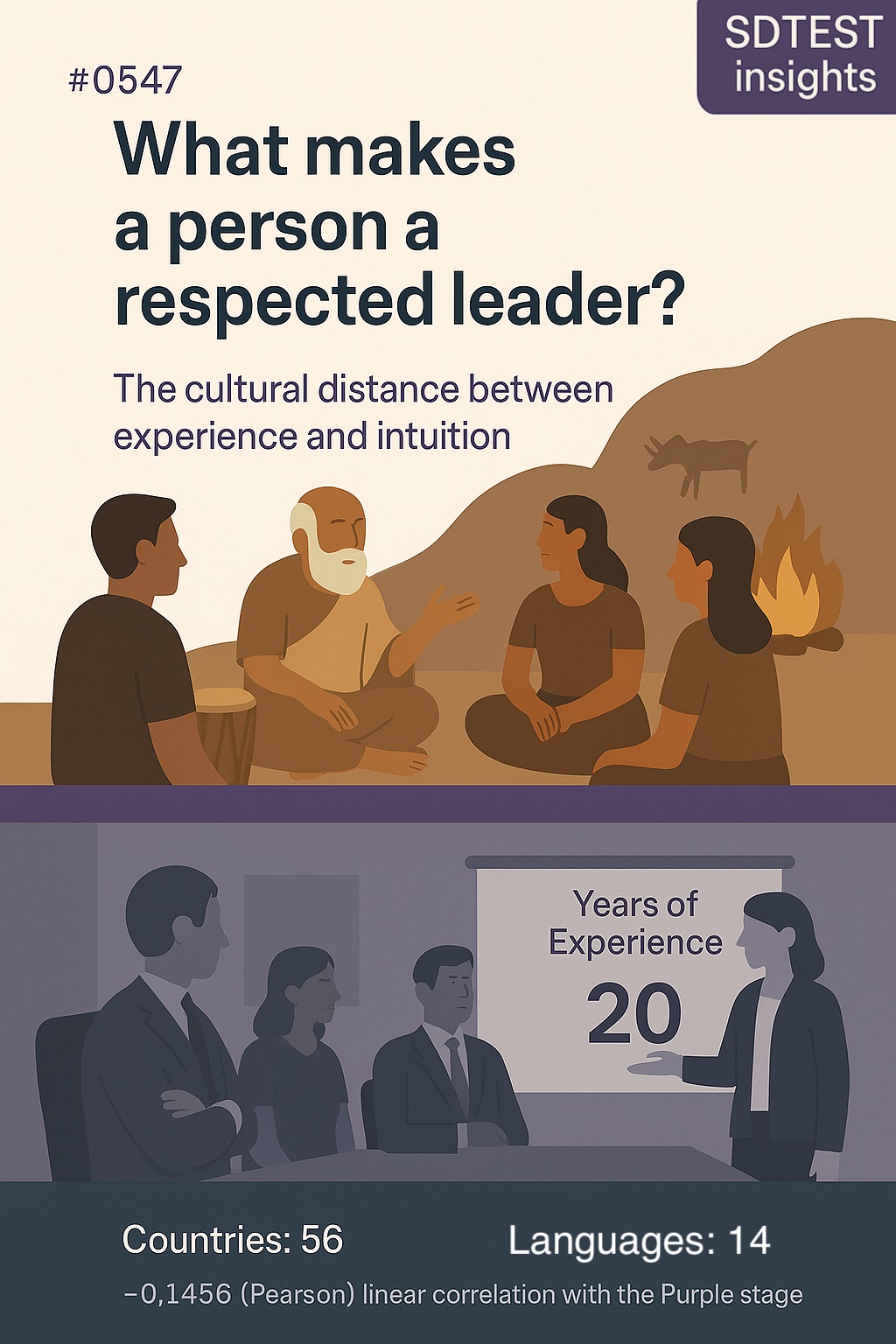
This negative correlation of -0.1456 between the Number of years of experience in management positions and the Purple stage offers profound insights when viewed through the lens of the Purple value system:
Organizational Perspective:
Organizations operating within the Purple mindset might interpret this correlation as:
- Validation that wisdom and leadership come from spiritual calling and ancestral blessing rather than accumulated secular experience
- Confirmation that their traditional hierarchy based on bloodlines, spiritual authority, and community respect transcends modern management credentials
- Evidence supporting their belief that the spirits of ancestors guide true leadership, making formal experience secondary to divine selection
These organizations might respond by:
- Elevating leaders chosen through traditional rituals, divination, or ancestral signs rather than management track records
- Implementing succession systems based on spiritual lineage, tribal wisdom, or mystical calling
- Promoting elders and spiritual guides who embody ancestral knowledge over those with extensive management experience
Team Perspective:
Teams operating from a Purple mindset might approach this correlation by:
- Viewing it as an affirmation that their reverence for traditional leadership selection methods supersedes modern management paradigms
- Interpreting it as support for their belief that team harmony comes from spiritual unity and shared rituals rather than managerial expertise
- Seeing it as validation for prioritizing collective wisdom passed down through generations over individual management accomplishments
These teams might respond by:
- Conducting traditional ceremonies to select team leaders based on spiritual signs and community consensus
- Encouraging decision-making through tribal councils, ritual consultation, and ancestral guidance
- Celebrating leaders who embody sacred traditions and maintain spiritual connections with the group's origins
Individual Perspective:
Individuals aligned with the Purple value system might interpret this correlation as:
- Personal validation that their spiritual calling and connection to ancestral wisdom matter more than management credentials
- Evidence supporting their belief that leadership flows from divine appointment and community blessing rather than career advancement
- Confirmation that their identity is rooted in tribal belonging and spiritual purpose rather than professional achievement
These individuals might respond by:
- Actively seeking spiritual guidance and community recognition over formal management training
- Viewing their role as a sacred stewardship of tribal traditions rather than a career milestone
- Using rituals, ceremonies, and ancestral consultation to guide their leadership decisions and team interactions
This correlation, viewed through the Purple lens, suggests that those operating at the Purple level may find traditional management experience less relevant to their leadership paradigm. It implies that the Purple value system's emphasis on spirituality, tradition, and ancestral wisdom creates an alternative framework for understanding effective leadership.
The reasons why years of management experience might not be valued in the Purple stage could include:
- Sacred Authority: Leadership is seen as a divine calling or ancestral blessing rather than a skill developed through practice
- Collective Wisdom: Decision-making relies on community consensus and traditional knowledge rather than individual expertise
- Spiritual Guidance: Important choices are made through rituals, omens, and spiritual consultation rather than managerial analysis
- Tribal Identity: Leaders are chosen for their embodiment of group values and ancestral connection rather than professional credentials
- Cyclical Time: The Purple worldview often sees time as cyclical, making "years of experience" less meaningful than eternal spiritual truths
This correlation prompts us to consider how different value systems influence the definition of leadership effectiveness and organizational success. It raises questions about the potential wisdom embedded in traditional leadership selection methods and their relevance in contexts where community cohesion and spiritual alignment are paramount.
Ultimately, this correlation highlights the profound differences between modern management paradigms and traditional leadership systems. In Purple-dominant environments, management experience might be seen not as irrelevant but as fundamentally different from the spiritual and communal qualities that truly matter for guiding the tribe.
In our analysis of the poll "Oxford Happiness Survey," we found an intriguing positive linear correlation that warrants closer examination:
0.1191 (Pearson) between the I am always committed and involved / Strongly Disagree and the Red stage.
The critical value of the correlation coefficient for a non-normal distribution, by Spearman, is r = 0.0021. Nevertheless, this positive linear correlation of 0.1632 meets the reliability criteria but does not necessarily imply causation.
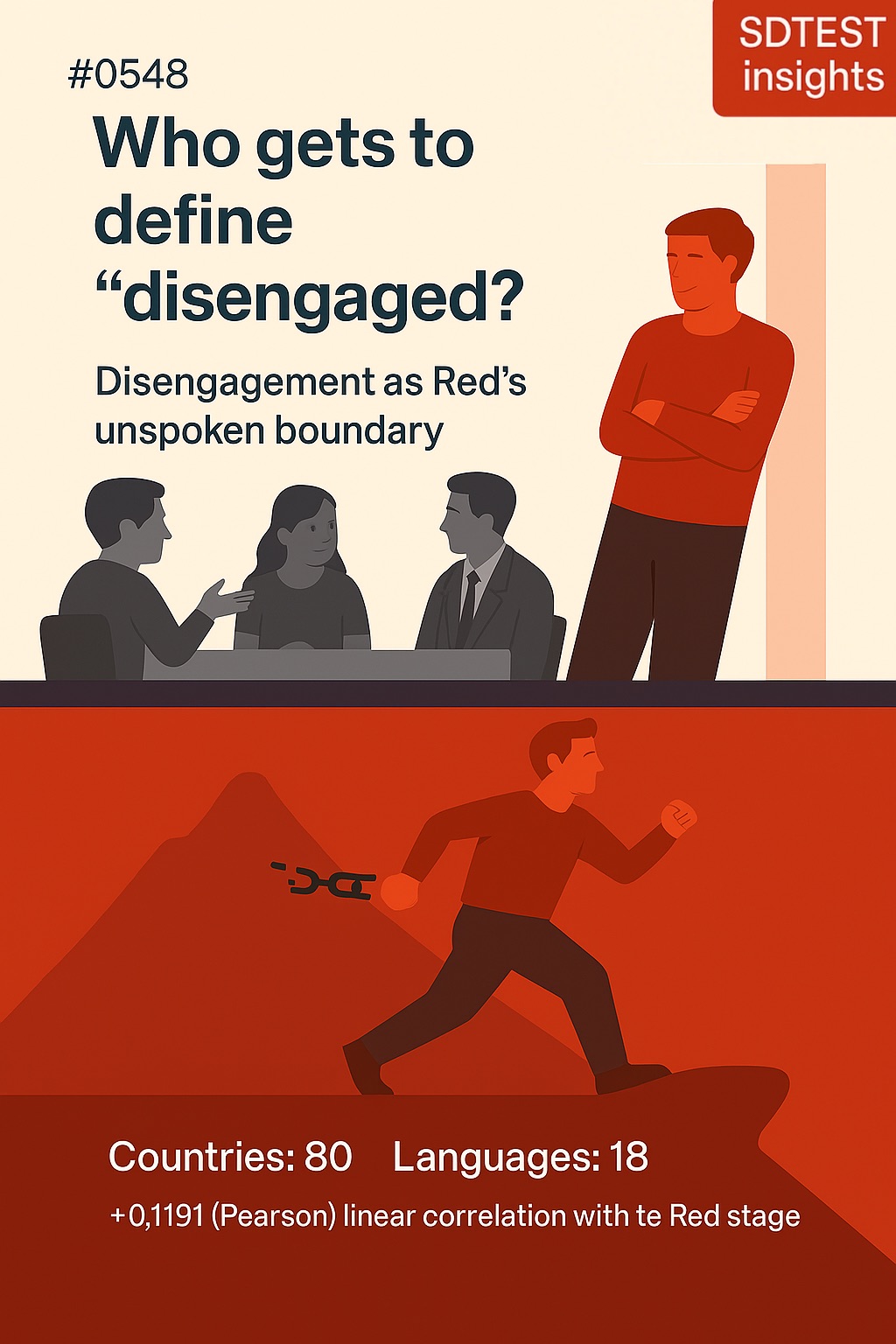
This positive correlation of 0.1191 between "I am always committed and involved / Strongly Disagree" and the Red stage offers compelling insights when viewed through the lens of the Red value system:
Organizational Perspective:
Organizations operating within the Red mindset might interpret this correlation as:
- Validation of their flexible, opportunistic approach, where commitment depends on immediate personal benefit and power gain
- Confirmation that their culture of individual dominance and self-interest naturally resists blanket organizational loyalty
- Evidence supporting their belief that true strength comes from maintaining independence and avoiding entrapment in long-term commitments
These organizations might respond by:
- Implementing short-term, results-based contracts that allow for quick pivots when better opportunities arise
- Rewarding leaders who can adapt quickly and abandon failing initiatives without emotional attachment
- Promoting a culture where commitment is earned through immediate rewards rather than expected unconditionally
Team Perspective:
Teams operating from a Red mindset might approach this correlation by:
- Viewing it as an affirmation of their belief that team loyalty must be constantly proven through tangible benefits
- Interpreting it as support for their competitive dynamic, where commitment fluctuates based on personal advantage
- Seeing it as validation for prioritizing individual success over sustained team involvement when conflicts arise
These teams might respond by:
- Creating fluid team structures where members can enter and exit based on personal opportunities
- Encouraging members to openly negotiate their level of involvement based on immediate personal gains
- Celebrating instances where team members successfully leverage their position for individual advancement
Individual Perspective:
Individuals aligned with the Red value system might interpret this correlation as:
- Personal validation of their instinct to avoid being trapped by commitments that limit their freedom and power
- Evidence supporting their belief that maintaining independence is crucial for seizing immediate opportunities
- Confirmation that their resistance to "always" being committed protects them from exploitation and weakness
These individuals might respond by:
- Actively avoiding situations that demand unconditional long-term commitment or involvement
- Viewing their flexible approach to commitment as a strategic advantage in competitive environments
- Using their willingness to disengage as leverage to negotiate better terms and conditions
This correlation, viewed through the Red lens, suggests that those operating at the Red level may naturally resist the concept of unwavering commitment and involvement. It implies that the Red value system's emphasis on personal power, immediate gratification, and self-preservation creates skepticism toward absolute dedication.
The reasons why people might strongly disagree with "always being committed and involved" in the Red stage could include:
- Freedom Protection: Absolute commitment is seen as a trap that limits personal freedom and opportunities for advancement
- Power Preservation: Maintaining the ability to withdraw or redirect energy preserves personal power and negotiating position
- Immediate Gratification: Long-term commitment conflicts with the desire for immediate rewards and instant satisfaction
- Self-Preservation: Always being involved makes one vulnerable to exploitation and limits escape routes when situations turn unfavorable
- Competitive Advantage: Keeping options open allows for quick pivots to more advantageous positions and opportunities
This correlation prompts us to consider how different value systems approach loyalty, dedication, and organizational involvement. It raises questions about the potential benefits of a more fluid, self-interested approach to commitment in rapidly changing competitive environments.
Ultimately, this correlation highlights the tension between traditional expectations of unwavering commitment and the Red value system's emphasis on personal power and freedom. In Red-dominant environments, the reluctance to "always" be committed might be seen not as disloyalty but as intelligent self-preservation and strategic flexibility that ultimately serves one's ability to dominate and succeed.
In our analysis of the poll "My greatest fears," we found an intriguing negative linear correlation that warrants closer examination:
-0.0439 (Pearson) between the Arbitrary rule of the authorities and the Blue stage.
The critical value of the correlation coefficient for a normal distribution, by William Sealy Gosset (Student), is r = 0.0312. Nevertheless, this negative linear correlation of -0.0439 meets the reliability criteria but does not necessarily imply causation.
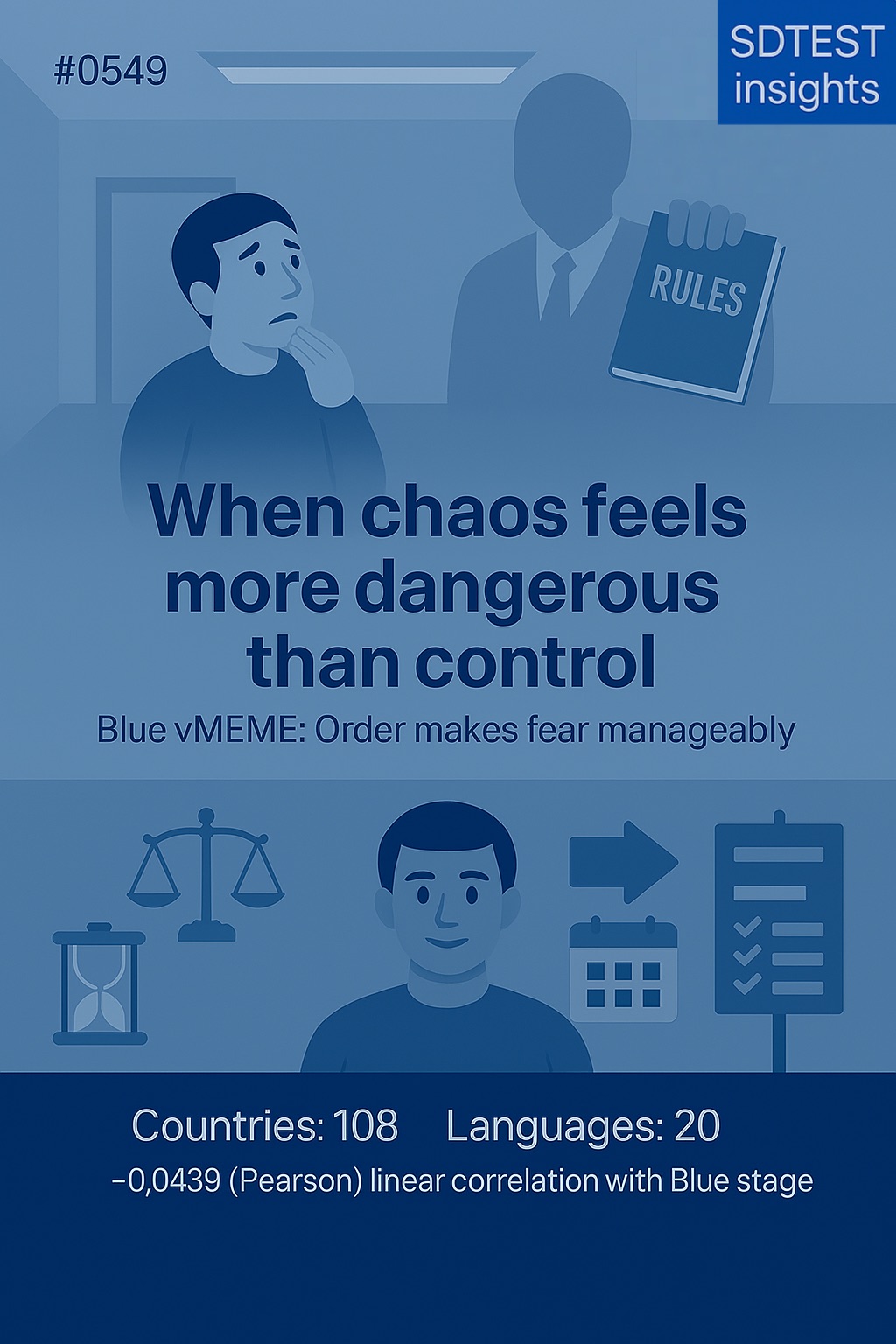
This negative correlation of -0.0439 between the Arbitrary rule of the authorities and the Blue stage offers profound insights when viewed through the lens of the Blue value system:
Organizational Perspective:
Organizations operating within the Blue mindset might interpret this correlation as:
- Validation of their foundational belief that legitimate authority stems from divine appointment, constitutional mandate, or established institutional hierarchy
- Confirmation that their structured, rule-based governance systems provide necessary order and moral guidance rather than arbitrary control
- Evidence supporting their conviction that proper authority serves a higher purpose and follows established protocols rather than personal whims
These organizations might respond by:
- Strengthening their emphasis on legitimate chains of command and clearly defined authority structures based on established principles
- Implementing comprehensive training programs that reinforce the moral foundation and proper exercise of institutional authority
- Promoting leaders who demonstrate unwavering commitment to established procedures, ethical codes, and organizational traditions
Team Perspective:
Teams operating from a Blue mindset might approach this correlation by:
- Viewing it as an affirmation of their trust in properly constituted leadership that follows established protocols and moral guidelines
- Interpreting it as support for their belief that true authority serves the greater good through adherence to proven systems and values
- Seeing it as validation for their acceptance of hierarchical structures when they operate according to legitimate principles and traditions
These teams might respond by:
- Establishing clear protocols and procedures that ensure authority is exercised according to established rules and moral principles
- Encouraging team members to respect and support legitimate leadership while maintaining accountability to higher standards
- Celebrating instances where authority figures demonstrate proper stewardship of their responsibilities according to established codes
Individual Perspective:
Individuals aligned with the Blue value system might interpret this correlation as:
- Personal validation of their trust in legitimate authority that operates according to divine will, constitutional law, or established moral codes
- Evidence supporting their belief that proper authority provides necessary structure and guidance for righteous living
- Confirmation that their respect for institutional hierarchy reflects wisdom about the need for order and moral governance
These individuals might respond by:
- Actively supporting and defending legitimate authority figures who demonstrate adherence to proper principles and procedures
- Viewing their obedience to rightful authority as a moral duty and expression of their commitment to order and tradition
- Using established channels and procedures to address concerns about authority rather than questioning the fundamental legitimacy of institutional hierarchy
This correlation, viewed through the Blue lens, suggests that those operating at the Blue level may not fear authority when it operates according to legitimate principles and established procedures. It implies that the Blue value system's emphasis on order, duty, and moral codes creates trust in properly constituted authority rather than fear of arbitrary rule.
The reasons why the Arbitrary rule of the authorities might not be feared in the Blue stage could include:
- Divine Legitimacy: True authority is seen as appointed by God or higher moral principles, making arbitrary rule impossible when properly exercised
- Constitutional Framework: Legitimate authority operates within established legal and moral boundaries that prevent arbitrary decision-making
- Moral Accountability: Proper authorities are accountable to higher laws and principles, ensuring their decisions serve righteous purposes
- Institutional Wisdom: Established systems and traditions provide safeguards against the abuse of power through checks, balances, and moral codes
- Dutiful Service: True authority figures are seen as servants of higher principles rather than self-serving rulers, eliminating the arbitrariness of personal agenda
This correlation prompts us to consider how different value systems approach the relationship between individual liberty and institutional authority. It raises questions about the potential benefits of trust in legitimate governance structures and the role of moral frameworks in preventing the abuse of power.
Ultimately, this correlation highlights the Blue value system's fundamental distinction between legitimate authority that serves higher purposes and arbitrary rule that serves personal interests. In Blue-dominant environments, authority might be embraced rather than feared when it operates according to established moral codes, constitutional principles, and divine mandate, creating a framework where "arbitrary rule" becomes a contradiction in terms when authority is properly exercised.
In our analysis of the poll "Are you ready to receive less pay to work remotely?" we found an intriguing positive linear correlation that warrants closer examination:
0.1272 (Pearson) between the I am not ready to receive less pay to work remotely and the Orange stage.
The critical value of the correlation coefficient for a normal distribution, by William Sealy Gosset (Student), is r = 0.0592. Nevertheless, this positive linear correlation of 0.1632 meets the reliability criteria but does not necessarily imply causation.
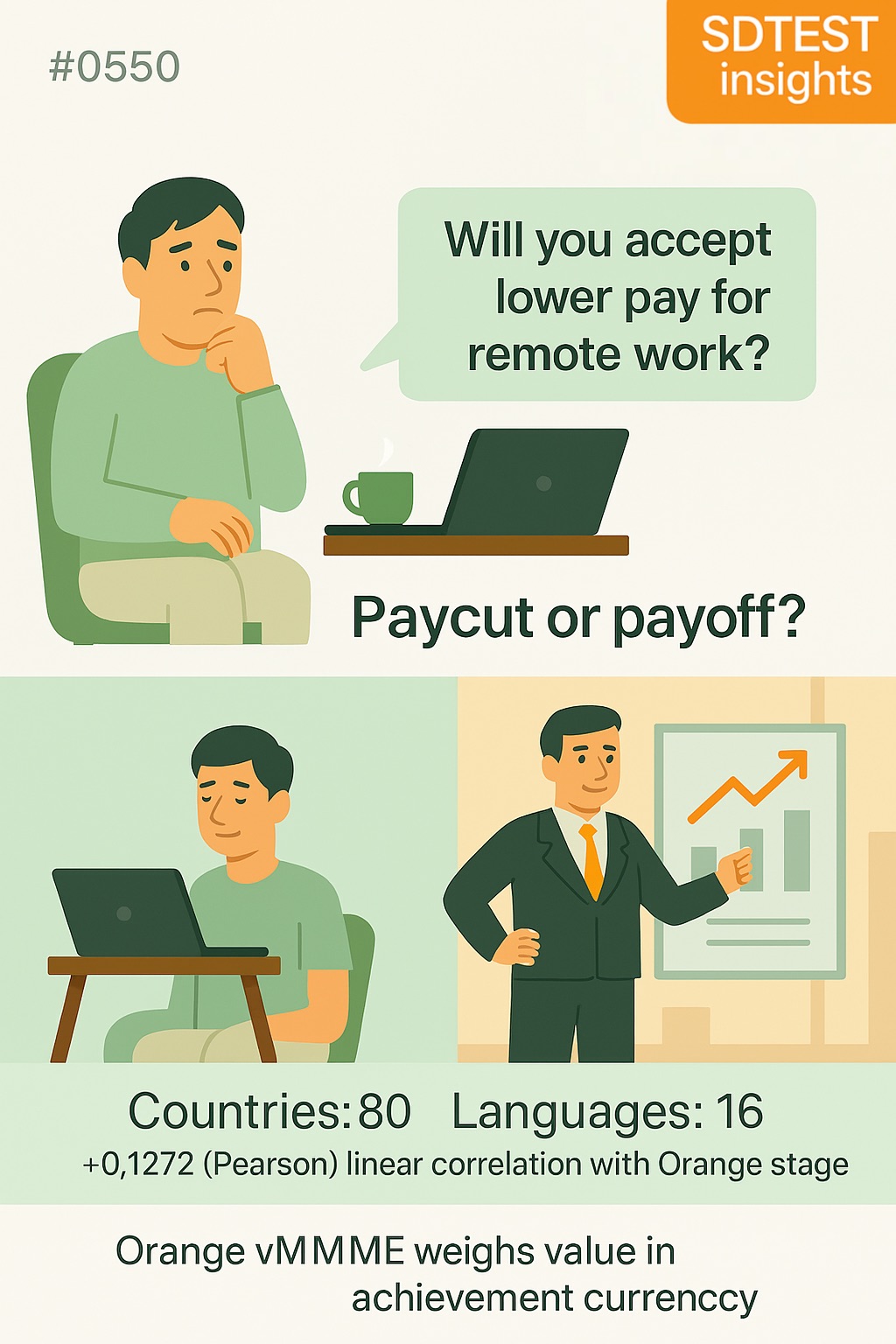
This positive correlation of 0.1272 between "I am not ready to receive less pay to work remotely" and the Orange stage offers compelling insights when viewed through the lens of the Orange value system:
Organizational Perspective:
Organizations operating within the Orange mindset might interpret this correlation as:
- Validation of their performance-based compensation philosophy, where market value and measurable results determine fair pay regardless of work location
- Confirmation that their data-driven approach to talent management prioritizes quantifiable outcomes over subjective workplace preferences
- Evidence supporting their belief that rational economic principles should govern employment decisions rather than lifestyle accommodations
These organizations might respond by:
- Implementing objective performance metrics and productivity measurements that justify compensation levels independent of work location
- Developing sophisticated analytical models to determine optimal compensation strategies based on market data and individual performance
- Promoting merit-based pay structures that reward results and efficiency rather than offering lifestyle subsidies through reduced remote compensation
Team Perspective:
Teams operating from an Orange mindset might approach this correlation by:
- Viewing it as an affirmation of their focus on measurable productivity and goal achievement over work-life balance considerations
- Interpreting it as support for their competitive dynamic, where compensation reflects individual contribution and market value
- Seeing it as validation for prioritizing objective performance standards and financial optimization over subjective comfort preferences
These teams might respond by:
- Establishing clear performance benchmarks and KPIs that justify compensation levels based on results rather than work arrangements
- Encouraging team members to maximize their market value and negotiate compensation based on measurable contributions
- Celebrating instances where team members achieve superior results that warrant premium compensation regardless of location
Individual Perspective:
Individuals aligned with the Orange value system might interpret this correlation as:
- Personal validation of their rational approach to career advancement and financial optimization through strategic decision-making
- Evidence supporting their belief that accepting reduced pay for remote work privileges undermines their market value and professional progress
- Confirmation that their analytical assessment of compensation trade-offs prioritizes long-term financial goals over short-term lifestyle conveniences
These individuals might respond by:
- Actively negotiating compensation packages that reflect their market value and performance metrics rather than accepting lifestyle-based discounts
- Viewing their refusal to accept reduced remote pay as a strategic investment in their professional worth and career trajectory
- Using data-driven analysis to optimize their total compensation and career advancement opportunities
This correlation, viewed through the Orange lens, suggests that those operating at the Orange level may apply rational economic analysis to remote work compensation decisions. It implies that the Orange value system's emphasis on efficiency, results, and logical thinking creates resistance to accepting reduced pay for lifestyle accommodations.
The reasons why people might not be ready to receive less pay to work remotely in the Orange stage could include:
- Market Value Optimization: Compensation should reflect measurable performance and market rates rather than subjective lifestyle preferences
- Rational Cost-Benefit Analysis: The financial impact of reduced pay outweighs the perceived benefits of remote work flexibility when analyzed objectively
- Career Advancement Strategy: Accepting lower compensation could signal reduced professional ambition and negatively impact long-term earning potential
- Efficiency Maximization: Remote work should increase productivity and value creation, justifying equal or higher compensation rather than reductions
- Competitive Positioning: Maintaining market-rate compensation preserves negotiating power and professional standing in the competitive landscape
This correlation prompts us to consider how different value systems approach the relationship between compensation, work arrangements, and professional development. It raises questions about the economic rationality of remote work compensation models and their impact on talent optimization strategies.
Ultimately, this correlation highlights the Orange value system's application of scientific and logical thinking to employment decisions. In Orange-dominant environments, the resistance to reduced remote pay might be seen not as inflexibility but as rational economic behavior that optimizes individual performance, market positioning, and long-term financial success through data-driven decision-making.
In our analysis of the poll "Ageism’s causes," we found an intriguing positive linear correlation that warrants closer examination:
0.0998 (Pearson) between the Yes, interpersonal interactions reflect broader social attitudes, and the Green stage.
The critical value of the correlation coefficient for a normal distribution, by William Sealy Gosset (Student), is r = 0.0825. Nevertheless, this positive linear correlation of 0.0998 meets the reliability criteria but does not necessarily imply causation.
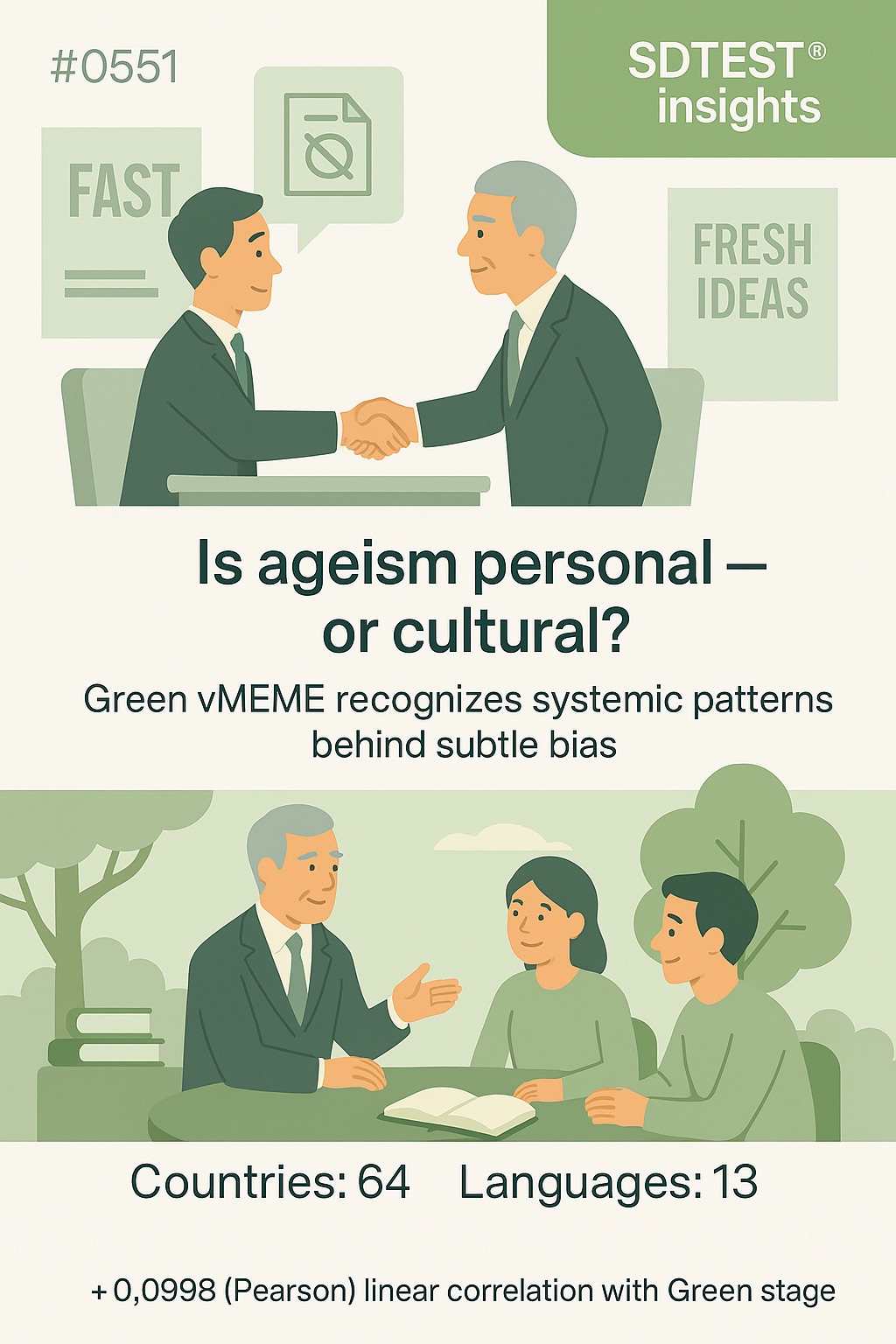
This positive correlation of 0.0998 between "Yes, interpersonal interactions reflect broader social attitudes" and the Green stage offers profound insights when viewed through the lens of the Green value system:
Organizational Perspective:
Organizations operating within the Green mindset might interpret this correlation as:
- Validation of their systems-thinking approach that recognizes how individual behaviors are interconnected with larger societal patterns and cultural dynamics
- Confirmation that their holistic understanding of workplace culture acknowledges the deep connections between personal interactions and systemic social inequalities
- Evidence supporting their belief that organizational transformation requires addressing both interpersonal dynamics and broader social justice issues simultaneously
These organizations might respond by:
- Implementing comprehensive diversity, equity, and inclusion programs that address both individual bias and systemic organizational barriers
- Developing training initiatives that help employees understand how their personal interactions contribute to larger patterns of social inclusion or exclusion
- Promoting leaders who demonstrate awareness of how organizational culture reflects and influences broader societal attitudes toward marginalized groups
Team Perspective:
Teams operating from a Green mindset might approach this correlation by:
- Viewing it as affirmation of their collaborative approach that recognizes how team dynamics mirror and influence wider social patterns of discrimination and acceptance
- Interpreting it as support for their belief that creating inclusive team environments requires understanding the interconnection between personal attitudes and cultural conditioning
- Seeing it as validation for their commitment to addressing both individual behaviors and systemic team practices that perpetuate social inequalities
These teams might respond by:
- Establishing regular dialogue sessions that explore how team interactions reflect broader social attitudes and unconscious biases
- Encouraging team members to examine their own cultural conditioning and its impact on collaborative relationships
- Celebrating instances where team members demonstrate awareness of how their behavior contributes to either inclusive or exclusive team dynamics
Individual Perspective:
Individuals aligned with the Green value system might interpret this correlation as:
- Personal validation of their holistic worldview that recognizes how their interpersonal behaviors are shaped by and contribute to larger social patterns
- Evidence supporting their belief that personal transformation and social change are interconnected processes requiring both inner work and external action
- Confirmation that their commitment to inclusive relationships reflects their understanding of how individual actions ripple through interconnected social systems
These individuals might respond by:
- Actively examining their own unconscious biases and cultural conditioning that influence their interpersonal interactions
- Viewing their personal relationships as opportunities to model inclusive behaviors that can contribute to broader social transformation
- Using their understanding of systemic interconnection to engage in both personal growth and collective action for social justice
This correlation, viewed through the Green lens, suggests that those operating at the Green level naturally recognize the deep interconnections between individual behavior and social systems. It implies that the Green value system's emphasis on holistic thinking and systems awareness creates understanding of how personal interactions both reflect and shape broader cultural attitudes.
The reasons why people might agree that interpersonal interactions reflect broader social attitudes in the Green stage could include:
- Systems Consciousness: Recognition that individual behaviors are embedded within larger social, cultural, and historical contexts that shape attitudes and responses
- Holistic Awareness: Understanding that personal interactions cannot be separated from the broader web of social relationships and cultural influences
- Interconnected Thinking: Belief that individual actions and attitudes are both products of and contributors to collective social consciousness and cultural patterns
- Social Justice Lens: Awareness that interpersonal dynamics often reproduce or challenge existing power structures and social inequalities
- Collective Responsibility: Recognition that creating inclusive societies requires understanding how individual behaviors contribute to either perpetuating or transforming social attitudes
This correlation prompts us to consider how different value systems understand the relationship between individual behavior and social change. It raises questions about the potential for personal transformation to contribute to broader social healing and the importance of addressing both individual and systemic factors in creating inclusive communities.
Ultimately, this correlation highlights the Green value system's sophisticated understanding of social dynamics and interconnection. In Green-dominant environments, the recognition that interpersonal interactions reflect broader social attitudes might be seen not as academic observation but as essential wisdom for creating authentic community, fostering social justice, and building sustainable relationships that honor the interconnected nature of human experience.
In our analysis of the poll "Where would be your next most exciting opportunity?" we found an intriguing negative linear correlation that warrants closer examination:
-0.1135 (Pearson) between the International Market leader and the Yellow stage.
The critical value of the correlation coefficient for a normal distribution, by William Sealy Gosset (Student), is r = 0.0523. Nevertheless, this negative linear correlation of -0.1135 meets the reliability criteria but does not necessarily imply causation.

This negative correlation of -0.1135 between the International Market leader and the Yellow stage offers fascinating insights when viewed through the lens of the Yellow value system:
Organizational Perspective:
Organizations operating within the Yellow mindset might interpret this correlation as:
- Validation of their evolved understanding that traditional market leadership metrics represent outdated, single-dimensional thinking that fails to capture true systemic value creation
- Confirmation that their integrative approach transcends the limitations of conventional competitive frameworks, seeking opportunities that address complex, multi-layered global challenges
- Evidence supporting their belief that genuine organizational evolution requires moving beyond market dominance toward regenerative, systems-aware business models that integrate multiple stakeholder perspectives
These organizations might respond by:
- Developing opportunity assessment frameworks that evaluate potential ventures based on systemic impact, evolutionary potential, and capacity for integrating multiple value systems
- Implementing decision-making processes that consider long-term ecosystem health and multi-dimensional value creation rather than traditional market position metrics
- Promoting leaders who demonstrate an ability to navigate complex, paradoxical opportunities that may appear less attractive through conventional market analysis but offer profound systemic transformation potential
Team Perspective:
Teams operating from a Yellow mindset might approach this correlation by:
- Viewing it as an affirmation of their capacity to see beyond surface-level market opportunities toward deeper patterns of emerging complexity and systemic need
- Interpreting it as support for their collaborative approach that values diverse perspectives and recognizes that exciting opportunities often emerge from integration rather than domination
- Seeing it as validation for their commitment to pursuing challenges that require sophisticated thinking and multi-level integration rather than straightforward market conquest
These teams might respond by:
- Establishing exploration processes that identify opportunities at the intersection of multiple systems, values, and emerging global needs
- Encouraging team members to develop their capacity for paradoxical thinking and comfort with ambiguous, complex challenges
- Celebrating instances where team members recognize exciting opportunities that transcend traditional market categories and require integrative solutions
Individual Perspective:
Individuals aligned with the Yellow value system might interpret this correlation as:
- Personal validation of their evolved consciousness that finds deeper fulfillment in complex, systemic challenges rather than conventional success metrics
- Evidence supporting their integrative worldview that recognizes market leadership as potentially limiting when it constrains innovation and systemic thinking
- Confirmation that their attraction to paradoxical, multi-dimensional opportunities reflects their capacity for second-tier thinking and developmental sophistication
These individuals might respond by:
- Actively seeking opportunities that challenge their integrative capacity and require navigation of complex, multi-stakeholder environments
- Viewing their disinterest in traditional market leadership roles as an indication of their readiness for more sophisticated, systemic challenges
- Using their understanding of developmental complexity to identify opportunities that serve both personal growth and collective evolution
This correlation, viewed through the Yellow lens, suggests that those operating at the Yellow level may transcend traditional opportunity frameworks in favor of more complex, integrative challenges. It implies that the Yellow value system's capacity for multiple perspectives and systems thinking creates attraction to opportunities that conventional market analysis might overlook or undervalue.
The reasons why people might not see the International Market leader as their next most exciting opportunity in the Yellow stage could include:
- Systemic Complexity Preference: Attraction to opportunities that require integration of multiple systems, perspectives, and paradoxical elements rather than linear market dominance
- Evolutionary Consciousness: Recognition that true excitement comes from contributing to collective development and systemic transformation rather than traditional competitive success
- Transcendent Purpose: Desire for opportunities that serve multi-dimensional value creation and address complex global challenges that transcend market categories
- Integrative Challenge: Preference for roles that require sophisticated navigation of paradox, ambiguity, and multi-stakeholder dynamics rather than straightforward market competition
- Developmental Readiness: Recognition that conventional leadership opportunities may no longer provide sufficient complexity to support their continued growth and contribution
This correlation prompts us to consider how advanced value systems redefine opportunity, success, and professional fulfillment. It raises questions about the emergence of post-conventional career paths and the potential for new forms of value creation that transcend traditional market frameworks.
Ultimately, this correlation highlights the Yellow value system's capacity to integrate and transcend previous models of success and opportunity. In Yellow-dominant environments, the lack of attraction to international market leadership may be seen not as a lack of ambition, but as evidence of an evolved consciousness that recognizes more complex, systemic opportunities for contribution and growth, serving both individual development and collective evolution.
In our analysis of the poll "Biggest problems facing my country," we found an intriguing positive linear correlation that warrants closer examination:
0.0738 (Pearson) between the Quality of public schools and the Turquoise stage.
The critical value of the correlation coefficient for a normal distribution, by William Sealy Gosset (Student), is r = 0.0458. Nevertheless, this positive linear correlation of 0.0738 meets the reliability criteria but does not necessarily imply causation.
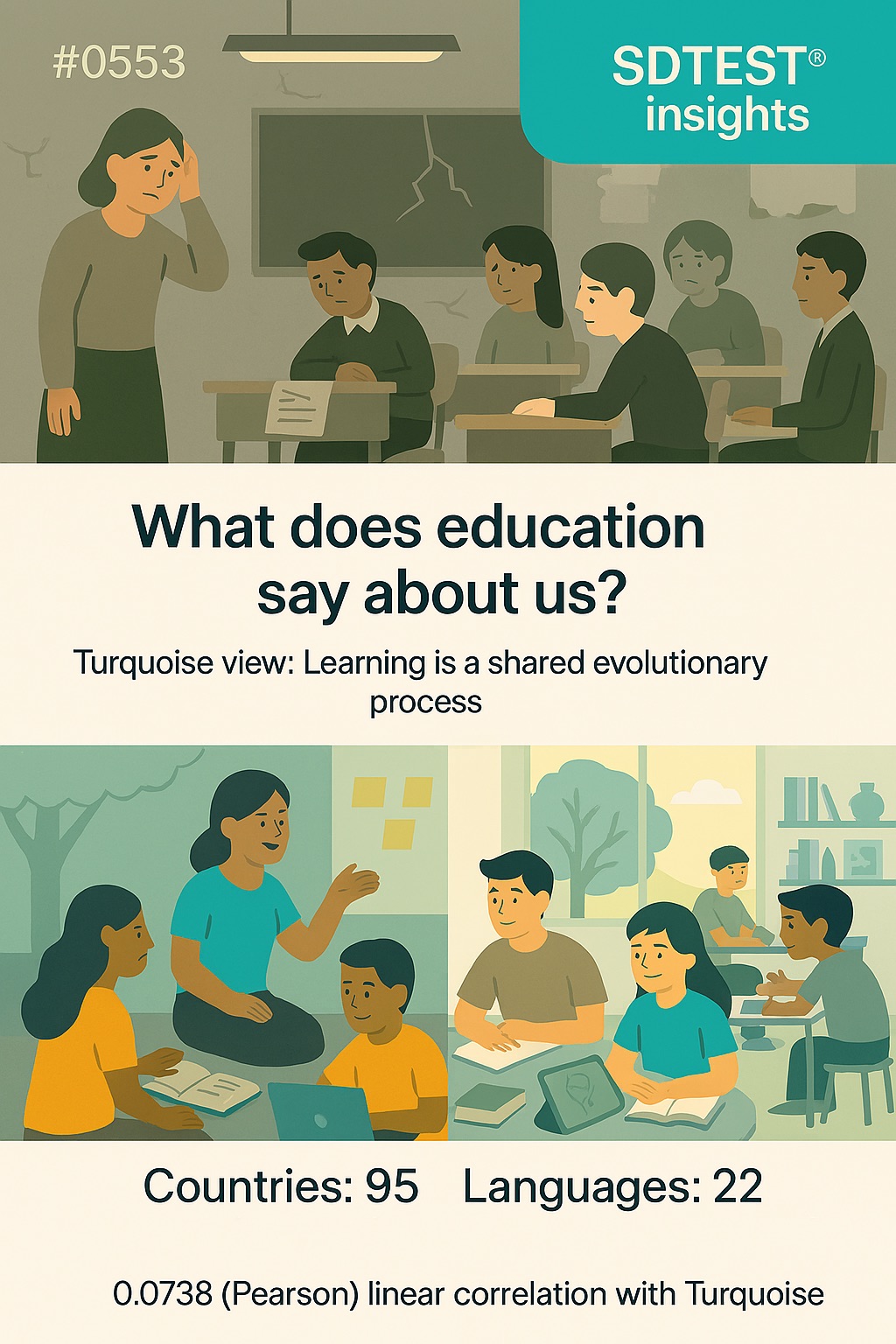
This positive correlation of 0.0738 between the Quality of public schools and the Turquoise stage offers profound insights when viewed through the lens of the Turquoise value system:
Organizational Perspective:
Organizations operating within the Turquoise mindset might interpret this correlation as:
- Validation of their understanding that education quality represents a fundamental node in the interconnected web of societal health, affecting everything from ecological consciousness to social equity across generations
- Confirmation that their holistic systems perspective recognizes public education as the primary mechanism for developing integrated, ecologically-aware citizens capable of addressing complex planetary challenges
- Evidence supporting their belief that educational transformation is essential for cultivating the collective consciousness necessary for sustainable human-Earth relationships
These organizations might respond by:
- Developing comprehensive educational partnerships that integrate ecological wisdom, systems thinking, and spiritual development into traditional academic curricula
- Implementing regenerative business models that directly support public school transformation as part of their commitment to planetary and social healing
- Promoting leaders who understand education as a sacred responsibility for nurturing the next generation's capacity for integrated thinking and ecological stewardship
Team Perspective:
Teams operating from a Turquoise mindset might approach this correlation by:
- Viewing it as an affirmation of their recognition that educational quality affects the entire web of life, influencing future generations' ability to navigate complex ecological and social challenges
- Interpreting it as support for their collaborative approach that sees education as a community responsibility requiring integration of diverse perspectives and wisdom traditions
- Seeing it as validation for their commitment to addressing root causes of societal dysfunction through transformative educational experiences that honor both human potential and planetary wellbeing
These teams might respond by:
- Establishing mentorship programs that bring holistic, systems-aware perspectives into public school environments through volunteer teaching and curriculum development
- Encouraging team members to engage in educational initiatives that bridge traditional academic learning with ecological wisdom and spiritual development
- Celebrating instances where team members contribute to educational transformation that prepares students for conscious participation in planetary healing
Individual Perspective:
Individuals aligned with the Turquoise value system might interpret this correlation as:
- Personal validation of their deep understanding that education shapes consciousness, and conscious beings is essential for addressing the interconnected crises facing humanity and the planet
- Evidence supporting their belief that educational quality affects the entire web of relationships, from local community health to global ecological balance
- Confirmation that their concern for educational transformation reflects their recognition of its central role in developing the integrated awareness necessary for planetary healing
These individuals might respond by:
- Actively engaging in educational initiatives that integrate ecological wisdom, systems thinking, and spiritual development into learning environments
- Viewing their investment in educational quality as part of their sacred responsibility to future generations and planetary wellbeing
- Using their understanding of interconnectedness to advocate for educational approaches that honor both individual development and collective ecological consciousness
This correlation, viewed through the Turquoise lens, suggests that those operating at the Turquoise level recognize education as a fundamental leverage point for planetary transformation. It implies that the Turquoise value system's holistic awareness fosters a deep concern for educational quality as an essential infrastructure for developing the consciousness necessary to address complex global challenges.
The reasons why the quality of public schools might be seen as one of the biggest problems facing the country in the Turquoise stage could include:
- Consciousness Development: Recognition that education shapes the collective consciousness necessary for addressing interconnected planetary crises and social challenges
- Systemic Leverage: Understanding that educational quality affects every aspect of society, from ecological awareness to social justice, across multiple generations
- Evolutionary Responsibility: Awareness that humanity's evolutionary development depends on educational systems that cultivate integrated thinking and ecological wisdom
- Interconnected Wellbeing: Recognition that educational quality directly impacts community health, environmental stewardship, and the capacity for sustainable living
- Sacred Stewardship: Understanding that education represents a sacred responsibility to nurture human potential while honoring our role as conscious participants in the web of life
This correlation prompts us to consider how advanced value systems understand education's role in collective transformation and planetary healing. It raises questions about the potential for educational reform to catalyze the development of the integrated consciousness necessary for addressing complex global challenges.
Ultimately, this correlation underscores the Turquoise value system's recognition of education as a vital infrastructure for planetary and social healing. In Turquoise-dominant environments, concern for public school quality may be seen not as a narrow policy issue, but as fundamental to humanity's capacity for conscious evolution and a sustainable relationship with the Earth's living systems.
What insights do you gain from today's correlation? How might we study this relationship more carefully before deducing causation?
We welcome respectful and wise perspectives! Stay tuned every week as we share more results and insights.
After login or registration, free access to the poll results in the FAQ section.
[1] www.linkedin.com/company/talent-management-institute
2025.07.06
FearpersonqualitiesprojectorganizationalstructureRACIresponsibilitymatrixCritical ChainProject Managementfocus factorJiraempathyleadersbossGermanyChinaPolicyUkraineRussiawarvolatilityuncertaintycomplexityambiguityVUCArelocatejobproblemcountryreasongive upobjectivekeyresultmathematicalpsychologyMBTIHR metricsstandardDEIcorrelationriskscoringmodelGame TheoryPrisoner's Dilemma
Valerii Kosenko
Product Owner SaaS SDTEST®
Valerii was qualified as a social pedagogue-psychologist in 1993 and has since applied his knowledge in project management.
Valerii obtained a Master's degree and the project and program manager qualification in 2013. During his Master's program, he became familiar with Project Roadmap (GPM Deutsche Gesellschaft für Projektmanagement e. V.) and Spiral Dynamics.
Valerii is the author of exploring the uncertainty of the V.U.C.A. concept using Spiral Dynamics and mathematical statistics in psychology, and 38 international polls.








